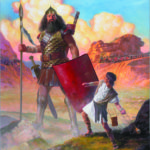The text for this lesson is 1 Kings 6–8
Key Point
- God commands that we learn His Word. God’s Word, the Bible, reveals the Word made flesh, Jesus Christ, who brings us forgiveness, life, and salvation.
- Law: At the dedication of the temple, Solomon prayed that the people would be true to God and obey His Word, for they often failed to listen to God’s Word and instead sinfully grumbled against God and worshiped idols. I, too, often fail to hold God’s Word sacred and gladly hear and learn it.
- Gospel: Jesus, the Word made flesh, taught and lived God’s Word perfectly on my behalf and then went to the cross to suffer and die in payment for my sins. He is the new temple where forgiveness is found.
Context
-
- Saul, Israel’s first king, turned from the Lord and experienced a continuing deterioration of his rule. Despite Saul’s murderous intentions against David, God protected the shepherd from Bethlehem, and he was eventually made Israel’s second king. By God’s grace and providence, David’s kingdom expanded to include both Israel and Judah. Under David’s rule, the ark of the covenant was returned to Jerusalem, and God promised to establish His kingdom into eternity, which was fulfilled through His Son, Jesus Christ, our Lord. Although David gave in to sexual temptation—committing adultery with Bathsheba and facilitating the death of her husband, Uriah—God remained faithful to His promise, bringing David’s son Solomon to the throne. By God’s grace, Solomon built the temple and dedicated it to the Lord, giving Him praise and charging the people to be faithful to God’s Word.
Commentary
The scope and detail of Solomon’s temple are impressive. As such, we might think that Solomon and his people had great fervor and dedication to the Lord. But we are also mindful of Israel’s past. Far from making every effort to preach, learn, and support the Word of God, the children of Israel demonstrated willingness to, at best, put God second and, at worst, disregard Him altogether. Quickly forgetting the Lord’s deliverance from slavery in Egypt, the people worshiped a golden calf at Sinai. We read in Judges how the people repeatedly embraced the gods of Canaan. Solomon’s own father, David, rejected the Sixth Commandment and took Uriah’s wife for himself.
As God’s people today, we fail to faithfully teach the Bible to our children. We take part in congregational worship sporadically, busied with other endeavors deemed more important. We give countless hours to career, friends, and recreation; yet, we allot only spare time to Bible study, often watering down or rejecting the more challenging and controversial portions of Scripture. Reflecting this same lack of priority in our stewardship of God’s gifts of time, talent, and treasure, we fail to support the preaching of the Gospel, while investing countless dollars in homes, cars, and electronic devices.
Serving as both a spiritual and political leader for the people of Israel, King Solomon leads the people in the construction and dedication of a new temple, investing myriad resources and hours of human labor in the effort. David’s son puts forth an impressive effort to model God-pleasing preaching, learning, and support of God’s Word, dedicating the temple to the Lord and exhorting the people to keep His commandments. Yet Solomon’s valiant efforts pale in comparison with our Lord’s flawless redemptive work. Jesus did not merely preach the Word; He fulfilled it. More than our perfect High Priest, Christ was Himself the Sacrifice for sins. The Prince of Peace did not simply support the teaching of Scripture through time and speech; He shed His very blood to wash sinners clean of sin and to present the Church holy and righteous before God.







